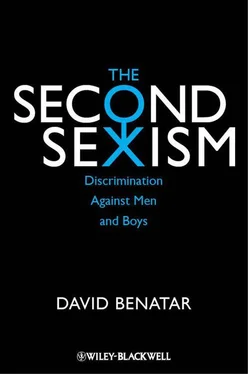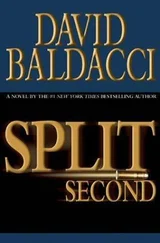1 ...6 7 8 10 11 12 ...125
Structure and Method of the Book
One way to have written this book would have been to devote a separate chapter to each of the disadvantages that males experience, arguing that it constitutes unfair discrimination and then responding to objections to those arguments. That is not the way I have written this book. Taking that route would have required unnecessary repetition of ideas and arguments. Thus I have opted for an alternative approach.
In Chapter 2, the chapter immediately following this introductory one, I present a range of disadvantages of being male. I do more than mention them. I also describe them in some detail in order to give a richer account, to convey the nature and seriousness of the disadvantages. I do this because some people have been inclined to dismiss the disadvantages as minor. They need to see why they are wrong. In some cases, the disadvantages are clearly the product of discrimination and sometimes de jure discrimination, but even in those cases further argument is required to show that the discrimination is wrongful. That further argument is delayed until Chapter 4.
Chapter 3 fulfills two purposes. First, I present what I take to be (some of) the beliefs and attitudes that play some role in explaining why males suffer the disadvantage they do, and I provide some argument why I take these beliefs and attitudes to play a role in bringing about those disadvantages. The third chapter also provides a framework for thinking about sex differences. Because disagreements about sex differences play such an important role in arguments about how men and women should be treated, it is crucial to avoid common mistakes in thinking about differences between the sexes.
In Chapter 4, I argue that most of the disadvantages of being male are also the result of wrongful discrimination. However, not every disadvantage, I shall argue, is attributable to wrongful discrimination. Some clearly are not. In other cases it is unclear whether they are, or the extent to which they are, the result of wrongful discrimination. However, even these cases are instructive because they have implications for some of those disadvantages of being female that are typically said to be instances of wrongful discrimination but may well not be.
Chapter 5 is devoted to considering various categories of objections to the claim that males are the victims of a second sexism. Thus my argument that there is a second sexism really develops over the course of a few chapters. It is only once the objections are considered and rejected in Chapter 5 that the bulk (but not all) of the argument for the existence of a second sexism is completed.
Chapter 6 examines sex-based affirmative action. Here I argue that those affirmative action policies and practices that involve giving preference to people of a particular sex are not an appropriate response to sexism. This is true irrespective of whether it is men or women who are the victims of the discrimination in question.
In Chapter 7, the concluding chapter, I consider such questions as the relative severity of the first and second sexism and whether feminism is bad for men. I also discuss the implications of taking the second sexism seriously.
This is not a work of armchair philosophy. My arguments, because they have to do with the real world, must be informed by the relevant facts about the world. However, the facts are often very difficult to establish and are sometimes in dispute. I have thus been as careful as I can be in my use of empirical data. Where I offer a citation in support of a claim I have endeavored, in most cases, to get to the most foundational authoritative source possible. For example, instead of citing a secondary source, I have attempted wherever possible to check a primary source directly and to cite that. (In a disturbing number of cases, I found, in checking the primary sources, they did not support the claim made in the secondary sources. In such cases I either sought alternative and appropriate evidence for the claim, or rejected the claim where the balance of evidence did not support it.)
Where it seems to me that the facts were unclear, I have indicated this and then either made conditional statements or found a way to bypass the dispute about the facts. Obviously I cannot claim, despite my efforts, to have avoided all error. I cover considerable ground and review empirical findings and data on many different issues. I cannot claim expertise in all these areas and it may turn out that I am ignorant of some relevant body of literature. Thus I would be grateful to be advised of any mistakes or lacunae that might be found. 47 47 My views have already evolved. In some cases, I previously thought that it was an open question whether a given disadvantage of being male was the product of discrimination, but subsequent reading suggested that it is.
It is also almost certainly the case that our knowledge about these matters will progress with the passage of time.
Moreover, the facts themselves may change. If men or women suffer some specific form of discrimination now, that might not be the case later. For that reason this book is unlikely to be a timeless work. Indeed, the hope is that it will not be. Instead the hope is that the problem the book raises will be addressed and either minimized or eliminated. However, given human nature and the way human societies function, it is also extremely unlikely that any of this will happen anytime soon. For that reason what I have to say will be more enduring than I would like it to be.
I have sought to be careful not only in the factual claims I make and the sources I cite in support of them, but also in the arguments I make. Many of those who argue that men are the victims of discrimination (along with many of those who claim that women are the victims of discrimination) resort to emotive polemics, in which bizarre claims and manifestly fallacious arguments are advanced. While my arguments are forthright and deal with issues to which many people will have emotional responses, I have attempted to maintain rigor in my argumentation. No doubt my critics will think I have failed to deliver satisfactory arguments, but then they must provide arguments of their own to say why they think that there is no second sexism.
Now that females are no longer being felled by childbirth, it has become clear that they enjoy an advantage in both psychological and biological robustness.
Constance Holden, “Why do women live longer than men?”
Science , 238, October 9, 1987, p. 158.
Many people are unable to think of any ways in which males are disadvantaged. The aim of this chapter is to rectify that. I shall present a number of examples of such disadvantage and provide some details about them. Because some of those who deny that there is a second sexism are inclined to dismiss these as minor matters, I shall spend some time explaining just how substantial some of these disadvantages are, either in the number of males who are affected or by the severity of the impact. In other cases, I devote some attention to demonstrating that there is in fact a disadvantage, because the facts may be in dispute.
The disadvantages are presented under various headings. These categories are for convenience, but there is actually considerable overlap between a few of them. I do not pretend to be exhaustive. There has been so little attention to male disadvantage that it is very likely that we do not even know all the ways in which males are disadvantaged. My examples are thus either those where it is clear — to all except the most ideological deniers of the second sexism — that males are disadvantaged, or those where we have sufficient data to demonstrate male disadvantage. Not every example of male disadvantage I shall mention in this book will be covered in this chapter. Sometimes, I shall raise an example incidentally in subsequent chapters as part of my arguments that there is a second sexism.
Читать дальше
Конец ознакомительного отрывка
Купить книгу












